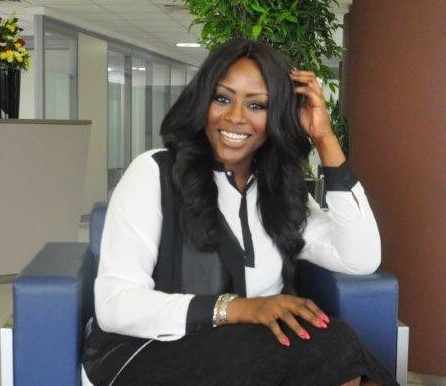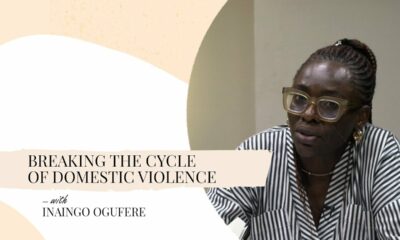Features
Talking Law with Ivie Omoregie: Victims of Domestic Violence, Here’s Where You Can Get Help
 Globally domestic violence is an enormous concern, with many cultures having accepted it as a fact of life. However, in recent years, due to the prevalence and the extreme conduct displayed in some instances, it has become a significant criminal issue.
Globally domestic violence is an enormous concern, with many cultures having accepted it as a fact of life. However, in recent years, due to the prevalence and the extreme conduct displayed in some instances, it has become a significant criminal issue.
In many African cultures, a woman married to a man becomes the possession and responsibility of the man. Nigeria reports an alarmingly high level of violence against women, with a reported one third of all women having experienced abuse by their partners. I have heard of instances where a man’s defence was “I am just disciplining her”. These men are of the genuine belief that, like children, their wives are innately indisciplined, and thus in need of setting straight.
The Crazed Bully
On Christmas eve, a very close friend of mine called me at 2am in distress. All I heard was “Ivie this man wants to kill me”; I immediately ran to her aid.
Upon getting there I learnt that her “boyfriend” of 5 months (not even husband ooh) had kicked down the front gate, dislocating her security guards shoulder in the process and smashed up her car. After he had smashed up every single breakable item on the car (all the windows, the side mirrors and head lamps), he proceeded to kick down a series of doors to get to her bedroom. His purported explanation was that he thought she had another man in the house because she wasn’t answering his calls. However, upon confirming there was no other man in the house, in a fit of rage, he proceeded to destroy her home, breaking everything breakable.
When his eyes had cleared, he began to apologise profusely and was begging her to “follow me to the house in Ikoyi, I will give you the money for the damage caused”. In his mind, as long as he could afford to pay for the damage caused, he could not fathom what the issue was.
I was speechless at the extent of the destruction and just thought to myself “this is how men kill their partners”.
Domestic Violence in Nigeria
I am sure we have all heard about the surge in instances where domestic violence has led to the deaths of young vibrant mothers. Unfortunately, many people still believe domestic violence is a matter that should be resolved in the privacy of the home, thus “allowing it to be shielded from outside scrutiny”.
More often than not, the ability of these women to seek help is significantly curtailed by their financial reliance on the man, thus in Nigeria we have historically found that the majority of women who experience domestic violence do not report these incidences to the correct authorities. Many would rather seek help from their own families or their husband’s families, thus resulting in the gross under reporting of domestic violence cases in Nigeria.
This article aims to highlight the legal assistance available should one (God forbid) find themselves in a situation where immediate assistance is required. As always, this article was written with Lagos state in mind. Therefore, I must stress that laws and policies do vary slightly from state to state.
Call the POLICE on 112
It is intriguing and somewhat disappointing that the majority of people do not even realise that in Nigeria we are able to call the police and trust that they will come (without asking for petrol money….). Historically, it may have been the case that, where the crime borders on domestic violence, the police were not adequately responsive to the complaints of the women concerned. However, I must stress that due to the heightened instances of death caused as a result of domestic violence, distress calls of such nature are taken very seriously by the emergency services. Thus, we often see a prompt response to same – often within 5 minutes in instances where the location has been clearly indicated (I must stress that the location must be clear and concise for distress calls to be effective… no one can help you if they don’t know where you are). By calling the police there should be an immediate diffusion of the situation. In most cases, the abuser will be carried away. Where the police feels the abuser is too big a man to arrest, at least they would get the complainant out of immediate harm.
Protection orders in Lagos State
The law regulating the application for protection orders is Lagos State’s “A Law to Provide Protection Against Domestic Violence and for Connected Purposes’. Where a protection order is granted, the abuser against whom the protection order is granted is prohibited from the following:
a. committing any act or any further act of domestic violence;
b. enlisting the help of another person to commit any of such act;
c. entering a residence shared by himself and the complainant(s): provided that the court may impose this application only if it appears to be in the best interest of the complainant;
d. entering a specific part of such a shared residence;
e. entering the complainant’s residence;
f. entering the complainant’s place of work;
g. preventing the complainant who ordinarily lives or lived in a shared residence as contemplate in sub-paragraph (c) from entering or remaining in the shared residence or a specified part of the shared residence; or
h. committing any other act as specified in the protection order.
An application for a protection order may be made by applying to the Magistrates or High Courts of Lagos State. The penalty for disobedience of this order is a fine of N100,000 (one hundred thousand Naira) or imprisonment for a period not exceeding 5 years. However, where there has been a flagrant disregard of the law, the courts may impose both the fine and imprisonment.
Criminal Undertaking
There are instances where either: –
a. the abuser has not actually committed an offence, but from the abuser’s conduct, it is clear that there is an imminent threat (actual conduct, text messages, messages passed through third parties etc); or
b. the complainant does not yet wish to file a court action but wants the abuse to stop.
In these instances, the complainant may report the incidences to the police, accompanied with the supporting evidence, and ask the police to invite the abuser to the police station in order to extract an undertaking from the abuser – in which the abuser would be effectively agreeing to abstain from certain conduct and stipulating the abusers guilt should such conduct persist.
Conclusion
Over the years many people have simply lost hope in the system. I have seen instances where some superhuman men believed they were above the law due to their socio-economic status in comparison to the complainants. I sincerely hope that this article helps someone.
We often read of many horrific stories but most people never contemplate the fact that those horrific stories are some people’s realities. In most instances where there has been a publication of someone’s story, they are either dead or severely injured. I’m not going to go into why some choose to stay in abusive relationships, it is not my place to judge someone else’s story. I simply wish to empathise that there is help should anyone need it.





















